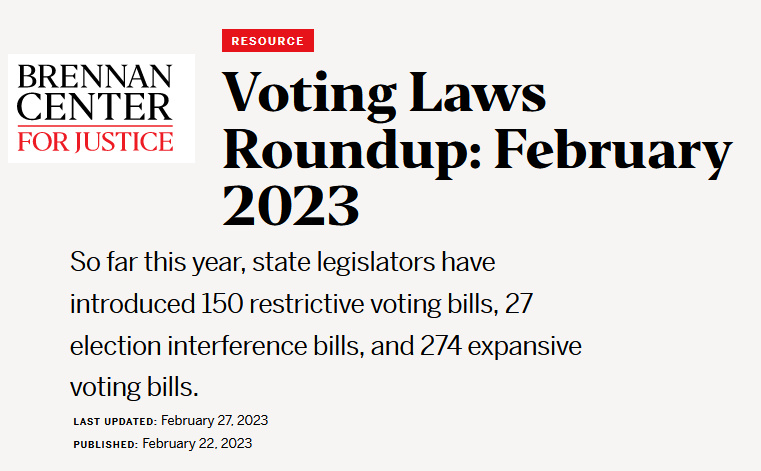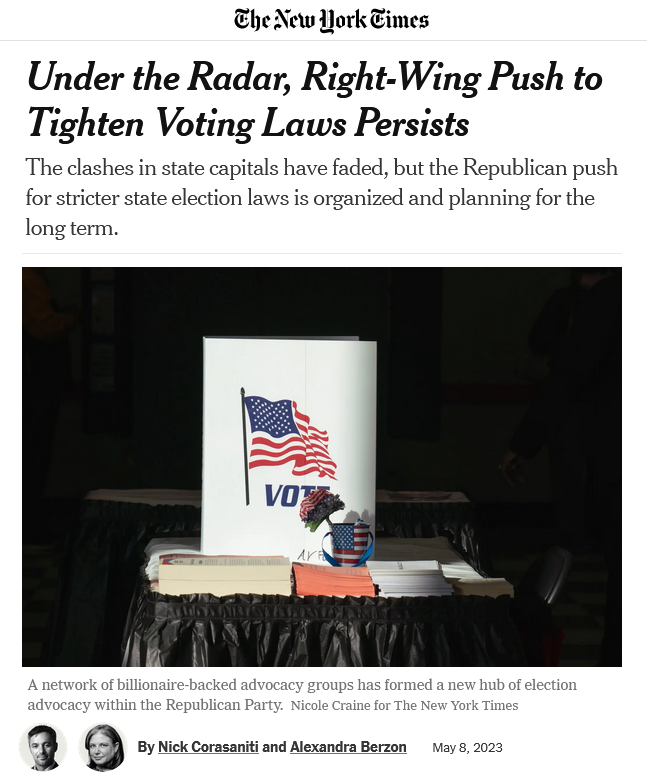We talk a lot about how Big Money tries to influence our government through campaign contributions, independent expenditures, and unaccountable dark money spending. Usually, we think of how corporate interests spend on legislative and executive elections to benefit their bottom line.
But we cannot ignore some of the subtler ways Big Money is undermining our democracy. This month’s blog focuses on two of those trends: how conservatives are trying to undermine voting rights behind the scenes, and how powerful interests are cozying up to judges in ways that threaten the integrity of our judicial system.
Conservatives quietly spending big to chip away at voting rights
No one should be surprised at the fact that some state legislators are trying to make it harder to vote, especially for younger people and minorities. The scale is a cause for concern, however: at least 150 bills were introduced in 32 states in the first month of 2023 alone, according to the Brennan Center for Justice.
it harder to vote, especially for younger people and minorities. The scale is a cause for concern, however: at least 150 bills were introduced in 32 states in the first month of 2023 alone, according to the Brennan Center for Justice.
These proposals range from the predictable ways to make voting harder (like voter ID requirements and scaling back mail-in voting, early voting, and drop boxes) to the bananas (like allowing states to overturn election results).
What should really set off alarm bells is how conservatives are changing their approach to undermine our democratic institutions. In what The New York Times calls a “second wave” of
 attacks on voting rights, billionaire-backed groups are uniting “under the radar” to chip away at voting rights one step at a time. These anti-democratic forces describe their approach as “radical incrementalism,” and it’s designed to be more “politically palatable” than the Trump-world proposals from 2021 that inspired public backlash.
attacks on voting rights, billionaire-backed groups are uniting “under the radar” to chip away at voting rights one step at a time. These anti-democratic forces describe their approach as “radical incrementalism,” and it’s designed to be more “politically palatable” than the Trump-world proposals from 2021 that inspired public backlash.
This may seem like the plot to a boring, B-list political thriller that you stumble across on TV after midnight. Many of these groups were involved in former President Trump’s efforts to overturn the 2020 election, and they have the support of high-profile conservative activists and donors.
The right to vote should be held sacred and not be a political football to be played with in order to disenfranchise citizens who might favor the other side. But these savvy, Big Money donors aren’t just playing the big game: they are often targeting specific races in order to hold on to legislative majorities, to prevent ideas like Ranked Choice Voting from taking hold, and even restricting the right of citizens to pass ballot initiatives in states where citizens may petition to protect abortion rights.
The Supreme Court ethics scandal: Big Money raising big questions about the judiciary’s integrity
Did you know that the 1978 Ethics in Government Act, passed in the aftermath of Watergate, requires high-ranking government officials to disclose their investments and gifts they receive? It’s probably not a shock, but you might be surprised (and pleased) to know that it applies not only to legislative and executive officials, but to judges as well. It even applies to the spouses of government officials.
The logic is simple: the public has a right to know what potential conflicts of interest you may have.
In recent weeks, however, we’ve seen stories that some of the nation’s most prominent judges are in outright violation of this law, and the appearance of impropriety alone is shocking.
There’s Supreme Court Justice Clarence Thomas, who has all sorts of dubious ties to billionaire real estate mogul Harlan Crow – a GOP megadonor. Thomas accepted travel and luxury lodging from Crow, and even sold several properties to Crow. Thomas repeatedly failed to disclose the source of these gifts and purchases, and sometimes completely failed to disclose the transactions at all.
Moreover, infamous judicial activist Leonard Leo (one of the major players in the conservative coalition to undermine voting rights via “radical incrementalism”) has directed $25,000 to Thomas’ wife, Ginny. The money was funneled through a nonprofit group Leo advises, with no formal disclosure.
The courts largely police themselves, but the law on disclosing these potential conflicts of interest is clear, as is the requirement that judges recuse themselves in such cases. But without the legal and cultural framework to compel transparency, we are left with blind faith that judges – who hold lifetime appointments – will do the right thing.
It’s hard to have faith that Chief Justice John Roberts, who recently declined to testify before Congress on judicial ethics, will set the tone for transparency. Roberts is embroiled in his own ethics concerns, as his wife, Jane, has earned millions of dollars in commissions as a legal recruiter for law firms, including some firms that had cases before the Supreme Court. Surprise! There are major questions about Roberts’ compliance with ethics and transparency obligations.
These scandals are just a drop in the bucket, and they have revived calls for a judicial “ethics code” that would strengthen the Ethics in Government Act and provide more robust oversight.
As we try to stamp Big Money out of politics, it’s important to keep an eye on the breadth of the problem. Campaign finance reform is important, but powerful interests will always been looking for novel ways to curry favor with decision-makers.
And we need to be vigilant!
